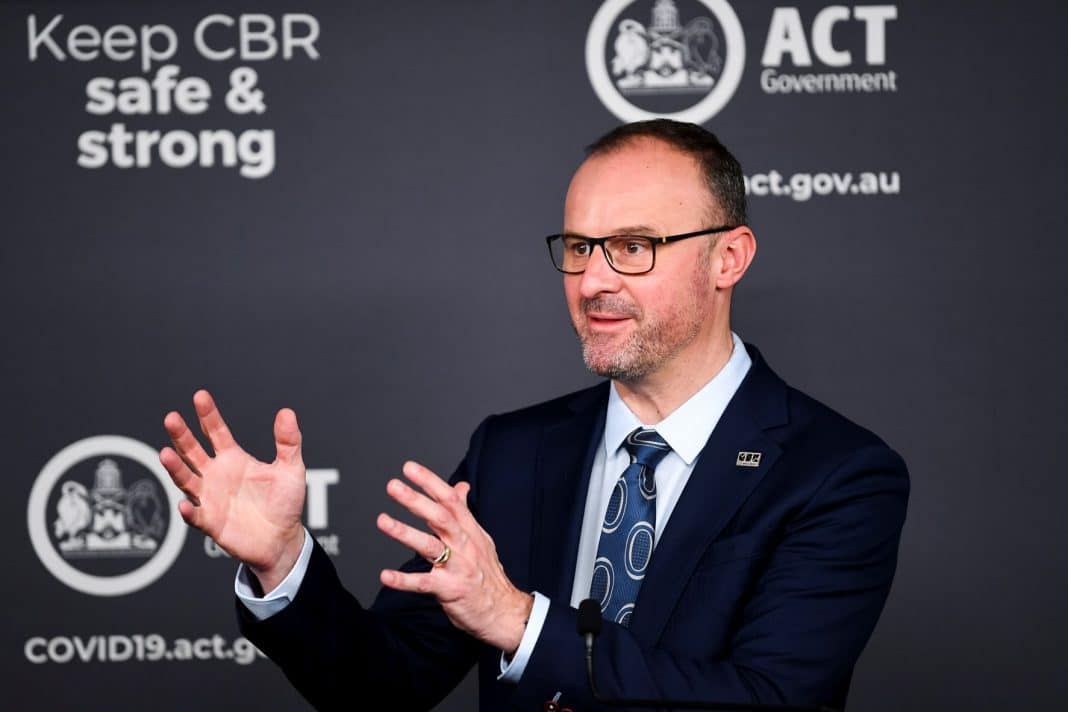Chief Minister Andrew Barr was jubilant this afternoon as he announced Canberra’s COVID restrictions would ease on Friday, two weeks earlier than expected, now 95 per cent of the population has been fully vaccinated.
“It is terrific to be able to stand here today, and confirm that all of that hard work, all that community effort, has resulted in an outcome like today,” Mr Barr said.
From Thursday 11 November at 11.59pm, there will be no more limits on home visits or informal outdoor gatherings. Cinemas, theatres, swimming pools, and outdoor entertainment venues with fixed seating (including Manuka Oval, GIO Stadium and Exhibition Park in Canberra) will be able to operate at 100 per cent capacity. Organised sport can resume.
Density limits will increase to one person per 2 sqm for sport venues, shops, and hospitality businesses. Drinking while standing will be permitted at licensed venues, cafes, and restaurants.
For the youngsters, nightclubs will reopen. (Mr Barr, however, demurred at the idea of taking to the dance floor himself.) There will be no density limits for outdoor spaces.
“Everyone has had a really tough time,” Mr Barr said. “We can’t completely let our guard down. But we can take the time to be with family and friends to do a few things we haven’t done in a little while, and I hope people can enjoy that, and enjoy it safely.”
Face masks will only be required in high-risk facilities such as hospitals, aged care facilities, correction and detention facilities, public transport, schools, airports and for some hospitality staff.
Canberrans should, however, wear face masks in crowded indoor settings to reduce transmission.
“If you are in an indoor area with a lot of people that you don’t normally mix with, and it’s hard to keep that social distance, then wearing a mask is sensible,” said ACT Chief Health Officer, Dr Kerryn Coleman.
Smaller gatherings also had less risk attached to them, she advised.
Many businesses that have operated under work from home arrangements will start to see their staff return to the office. Mr Barr, however, anticipated more hybrid working arrangements, “so people will find a nice balance between days in the office with colleagues, and still maintain that flexibility to work from home, where it suits them and their employer”.
These baseline measures were expected to be in place over the Christmas and summer holiday period, Mr Barr said; the government would review the restrictions in January.
The ACT was originally set to enter the next phase of eased restrictions on 26 November, but Mr Barr brought the date forward by two weeks. The ACT is now in line with NSW, as the Canberra Liberals and hospitality industry bodies called for last week.
More than 370,000 adult and teenage Canberrans have been fully vaccinated. 99 per cent have had their first dose, and 95 their second dose. Mr Barr expected close to 100 per cent vaccination coverage by the end of the month.
“This is just an extraordinary response from the community who have done the right thing to protect themselves, their family and friends, and the broader community,” the Chief Minister said.
“Canberrans should be incredibly proud of how we have responded to the pandemic.”
Three months ago, Mr Barr said, he had told Canberrans to brace themselves for a tough spring, but the government and health officials would work hard to make sure Christmas and summer were safer.
“We enter a new phase of our pandemic response,” Mr Barr said. “The pandemic isn’t over. And we still need to be careful, but with our vaccination rates as high as they are, and the understanding that Canberrans have demonstrated over these last three months of COVID-safe behaviours, we are very well placed to have a safe and happy Christmas period and a wonderful summer holiday. I know we’ve all been looking forward to this, and this is fantastic news for our city and our community.”
Mr Barr cautioned Canberrans to stay home if they felt unwell, get tested if they have COVID symptoms, and isolate while awaiting their result.
“You can still get the virus if you are fully vaccinated, and you can still transmit it to others. So we do still need to be vigilant.”
Children under 12 are still ineligible for vaccination, and cases of COVID-19 have been reported at 13 schools. These children experienced minor or no symptoms, and none had required hospitalisation, Dr Coleman said. Many young people had contracted the virus outside school, then attended school while infectious.
Dr Coleman advised parents to keep children at home if they had any symptoms.
“I know that this is particularly hard at the moment with our allergy season being particularly bad, and because a number of symptoms of covid are very similar to seasonal allergies. But please don’t just assume that what is affecting your child is allergies unless you have had a COVID-19 negative test. Please only let them go to school after you’ve received that negative test result.
“Previously, a sniffle was perhaps not a reason to keep your child home from school. However, maintaining our COVID-19 numbers at a reasonable level actually means that we’ve all had to adapt and change our way of life.”
Dr Coleman had started planning for a vaccination program for children 11 and under, once the TGA gives the go-ahead.
Mr Barr’s next “call to arms” is for Canberrans to get their booster shot before next winter, six months after their last shot. “The virus circulates more in winter than it does in summer.” By the end of May, he wants 95 per cent of the population to have had their booster dose.



